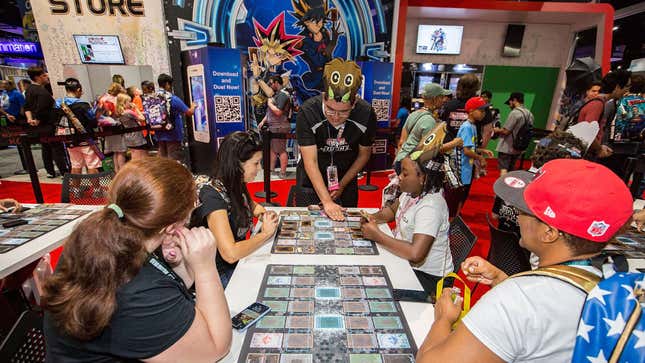
Yu-gi-oh never reached the same heights of global mainstream acceptability as Pokémon. The art had a bold style that never fell in line with mass market appeal, and each generation of cards came with a new convoluted ruleset that often stumped even the most dedicated fans. Yet the trading card game was how I found community with other immigrant kids in Texas, regardless of their faith or national origins.
Texas is a much more complicated place than the national media would have you believe. Sure, we have the Trump-voting, gun-toting Republicans off in their own part of the evangelical south. But we also had recent immigrants from China, Malaysia, Iran, and Turkey. Texans spoke different languages at home. Some went to church on Sundays, while others gathered at mosques. Many of us had one thing in common, though: We were ready to throw down in Duel Monsters. Whenever I met an immigrant kid who clearly had nerdy interests, it was perfectly safe to ask: “Hey, do you play Yu-gi-oh?” Some of my most vivid childhood memories involved trading cards with other immigrant kids on my front porch.
Despite its famously complicated tournament logic, YGO was an accessible language that the queer freaks, the geeks, and the mathletes could rally behind. The anime was immensely popular, and those who couldn’t afford to buy the DVDs could watch them in three parts on YouTube. And the game was mainstream enough that fans could simply buy the packs at their local Walmart. There was a beautiful logic to the rules that made it accessible to people who were raised differently. And no matter how uncool your culture was to “mainstream” Texas society, you could earn other duelists’ respect by studying as many cards and their uses as possible.
“Sometimes we make others happy, sometimes we hurt them, we sympathize, and we disagree... we learn that people’s thoughts and feelings are not a one-way street,” YGO creator Kazuki Takahashi wrote in the final volume of the manga. “The games that the characters played were not played facing monitors, but facing other people. The opponents that they played were the mirrors that reflected their hearts.”
In the manga, a long-deceased pharaoh was able to force modern-day duelists to acknowledge him because he was a skilled card player. But even in the low-stakes scenarios, characters without social status would play Duel Monsters in order to defend their pride, or to assert their convictions. For queer people who lived in Texas, we had to quietly submit to white Christian hegemony. But the anime showed its fans a fictional world where society’s outcasts didn’t have to accept humiliation. If a bully was picking on someone in the anime, then there was a means for the victim to exact their revenge: They could demolish their tormentor in a card game.
Obviously, I couldn’t do this in real life. Texas senator Ted Cruz would never agree to sit down with me in a game of Duel Monsters, and brilliant plays weren’t going to magically cure homophobia among my peers. But Takahashi sold us a fiction where it was possible for misfits to gain social acceptance by being smarter than their opponent. Our families had already been lured to this country by a siren song known as “The American Dream.” Their socially ostracized kids needed fantasies too.